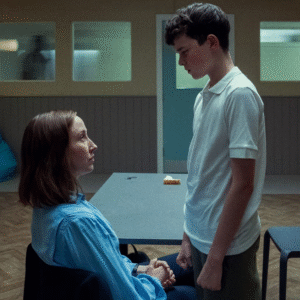17-year-old Varvara Tkachenko reflects on the part social media plays in the rise in male loneliness

Erin Doherty as psychologist Briony Ariston and Owen Cooper as murder suspect Jamie Miller in ‘Adolescence’.
Picture by: Netflix
Article link copied.
September 5, 2025
Are lonely males targeted victims of the ‘red pill’ algorithm?

Trigger warning: suicide
I have recently noticed how the internet is becoming flooded with content aimed at young men. Much of it puts pressure on men who are already struggling socially, insisting that good genetics, looks, and success with women define their worth.
As a young woman, it worries me to see how these algorithms pull boys and young men into a chain of insecurity and negativity, which in the end harms not only them but society’s gender standards.
Harbingers’ Weekly Brief
Male loneliness, depression and other struggles with mental health have all increased in recent years. Across many developed countries, men report feeling much less socially present than years before. In the United States, suicide rates in 2022 for men were quadruple those of women.
A 2021 survey conducted by the Survey Center of American Life showed how friendship is declining. In 1990, only 3% of American men said they had no close friends. In 2021, that had risen to 15%. Over the same period, the number of men who said they had ten or more close friends collapsed from 40% to just 15%.
Of course, there are many reasons for this, but the online world adds something different.
Incels, red pills and toxic masculinity
The conversation around such issues has started defining new concepts such as ‘involuntarily celibate’ (or incel), meaning a guy who is celibate due to the inability to attract women.
The ‘80/20 rule’claims that 80% of women are only attracted to 20% of men. Together, these ideas create the belief that men who aren’t in that 20% have little social value. This strengthens the notion that a man’s value in the modern world comes from their looks and social validation – which are, of course, types of pressure already familiar to women.
Social media is filled with videos promoting facial surgery and comparing a handsome model with an average-looking guy, adding to the pressure on young men to do anything they can to improve their looks – ‘looksmaxing’,as it is known.
The term ‘red pill’ is used to describe a supposed self-awakening about social and romantic norms.
It stems from the 1999 movie The Matrix, in which one has the choice of the blue pill (ignorance is bliss) or the red pill (accepting the painful truth). Essentially, the expression implies that men lack systemic power, while women control the social and sexual world.
Taking the ‘red pill’ has expanded into what is called the ‘black pill’, which pushes the concept to a darker extreme: that it is impossible to become more appealing to women. If you are below average-looking, then accept the black pill. It doesn’t solve the problem, but it makes sure you never hope again. As harmful as it sounds, this framing resonates with some men who already feel overlooked or powerless.
This further feeds into the problem of toxic masculinity, which emphasises the worst stereotypes of masculinity, such as violence, dominance and hostility towards women.
This toxic online environment was explored in the acclaimed mini-series Adolescence, which debuted on Netflix in March. It told the story of an investigation into the alleged murder of a teenage schoolgirl by a 13-year-old boy.
At first, the police focus on the boy’s relationship with his father, suspecting poor parenting. Yet they find no direct connection. What they uncover instead is the boy’s online activity, which shows how deeply he had been influenced by ‘red pill’ algorithms.
The narrative is powerful, and it raises a difficult question: is the decline in male mental health the result of conscious choice, or are many simply casualties of a digital ecosystem designed to keep them engaged?
This makes me wonder whether some men knowingly seek out these communities, while others are pulled in without realising it. In both cases, their worldview and identity become shaped by algorithmic narratives. The line between choice and algorithmic casualty feels blurred.
At the same time, the so-called epidemic of male loneliness is not solely about romance. A lack of close friendships, weak support networks, and a heavy presence and influence of social media all play a role in the decline in men’s mental health, alongside perpetuity of the pressure on men in patriarchal society.
Many voices online insist it is best to ‘accept the hard truth’ about one’s self-esteem. Yet in practice, this mindset harms mental health across nations, leaving many men less able to pursue careers, hobbies, relationships and love.
Written by:

Contributor
Kyiv, Ukraine | Copenhagen, Denmark
Born in 2007 in Kyiv, Ukraine, Varvara studies in Copenhagen, Denmark and plans to pursue her bachelor’s degree at the University of Amsterdam in the PPLE (Politics, Psychology, Law, and Economics) program.
She is interested in music, travelling, snow sports, Ukrainian culture, politics, and movies, For Harbingers’ Magazine, she writes about music, movies, culture, and sports.
In her free time, Varvara enjoys snowboarding, playing piano, crocheting, knitting, and horse riding. She also studied in France for a year, learning the language, and has been participating in debates for three years, from traditional debating formats to Model United Nations (MUN).
Varvara speaks Ukrainian, English, French, and Russian.
Edited by:

🌍 Join the World's Youngest Newsroom—Create a Free Account
Sign up to save your favourite articles, get personalised recommendations, and stay informed about stories that Gen Z worldwide actually care about. Plus, subscribe to our newsletter for the latest stories delivered straight to your inbox. 📲
© 2025 The Oxford School for the Future of Journalism


